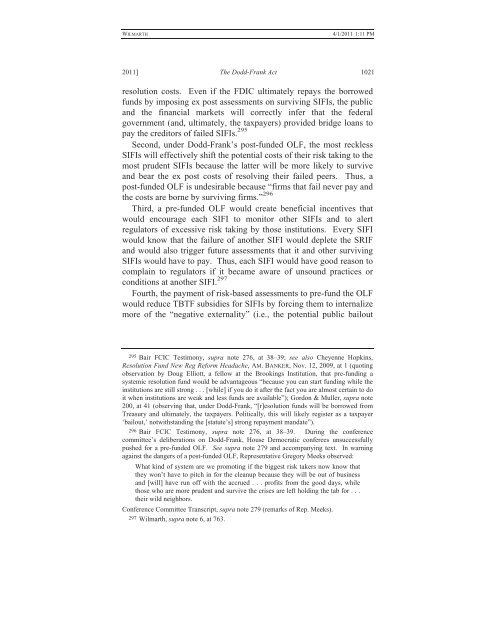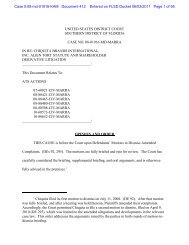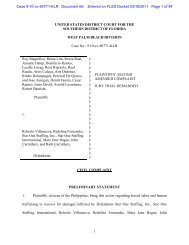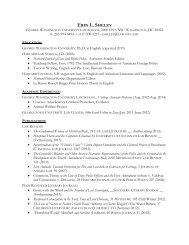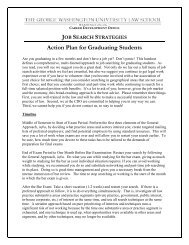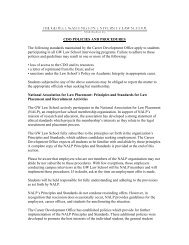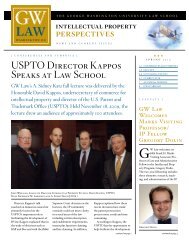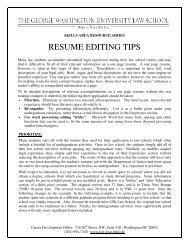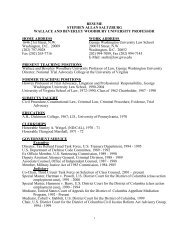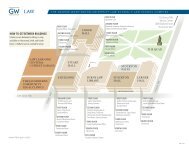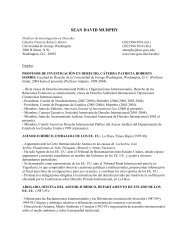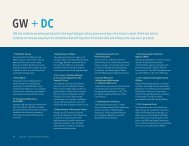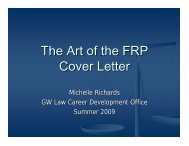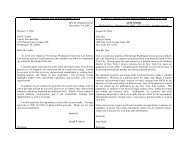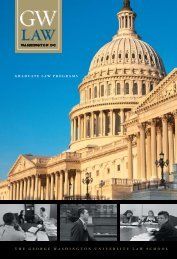CLE Materials for Panel #1 - George Washington University Law ...
CLE Materials for Panel #1 - George Washington University Law ...
CLE Materials for Panel #1 - George Washington University Law ...
Create successful ePaper yourself
Turn your PDF publications into a flip-book with our unique Google optimized e-Paper software.
WILMARTH<br />
4/1/2011 1:11 PM<br />
2011] The Dodd-Frank Act 1021<br />
resolution costs. Even if the FDIC ultimately repays the borrowed<br />
funds by imposing ex post assessments on surviving SIFIs, the public<br />
and the financial markets will correctly infer that the federal<br />
government (and, ultimately, the taxpayers) provided bridge loans to<br />
pay the creditors of failed SIFIs. 295<br />
Second, under Dodd-Frank’s post-funded OLF, the most reckless<br />
SIFIs will effectively shift the potential costs of their risk taking to the<br />
most prudent SIFIs because the latter will be more likely to survive<br />
and bear the ex post costs of resolving their failed peers. Thus, a<br />
post-funded OLF is undesirable because “firms that fail never pay and<br />
the costs are borne by surviving firms.” 296<br />
Third, a pre-funded OLF would create beneficial incentives that<br />
would encourage each SIFI to monitor other SIFIs and to alert<br />
regulators of excessive risk taking by those institutions. Every SIFI<br />
would know that the failure of another SIFI would deplete the SRIF<br />
and would also trigger future assessments that it and other surviving<br />
SIFIs would have to pay. Thus, each SIFI would have good reason to<br />
complain to regulators if it became aware of unsound practices or<br />
conditions at another SIFI. 297<br />
Fourth, the payment of risk-based assessments to pre-fund the OLF<br />
would reduce TBTF subsidies <strong>for</strong> SIFIs by <strong>for</strong>cing them to internalize<br />
more of the “negative externality” (i.e., the potential public bailout<br />
295 Bair FCIC Testimony, supra note 276, at 38–39; see also Cheyenne Hopkins,<br />
Resolution Fund New Reg Re<strong>for</strong>m Headache, AM. BANKER, Nov. 12, 2009, at 1 (quoting<br />
observation by Doug Elliott, a fellow at the Brookings Institution, that pre-funding a<br />
systemic resolution fund would be advantageous “because you can start funding while the<br />
institutions are still strong . . . [while] if you do it after the fact you are almost certain to do<br />
it when institutions are weak and less funds are available”); Gordon & Muller, supra note<br />
200, at 41 (observing that, under Dodd-Frank, “[r]esolution funds will be borrowed from<br />
Treasury and ultimately, the taxpayers. Politically, this will likely register as a taxpayer<br />
‘bailout,’ notwithstanding the [statute’s] strong repayment mandate”).<br />
296 Bair FCIC Testimony, supra note 276, at 38–39. During the conference<br />
committee’s deliberations on Dodd-Frank, House Democratic conferees unsuccessfully<br />
pushed <strong>for</strong> a pre-funded OLF. See supra note 279 and accompanying text. In warning<br />
against the dangers of a post-funded OLF, Representative Gregory Meeks observed:<br />
What kind of system are we promoting if the biggest risk takers now know that<br />
they won’t have to pitch in <strong>for</strong> the cleanup because they will be out of business<br />
and [will] have run off with the accrued . . . profits from the good days, while<br />
those who are more prudent and survive the crises are left holding the tab <strong>for</strong> . . .<br />
their wild neighbors.<br />
Conference Committee Transcript, supra note 279 (remarks of Rep. Meeks).<br />
297 Wilmarth, supra note 6, at 763.


